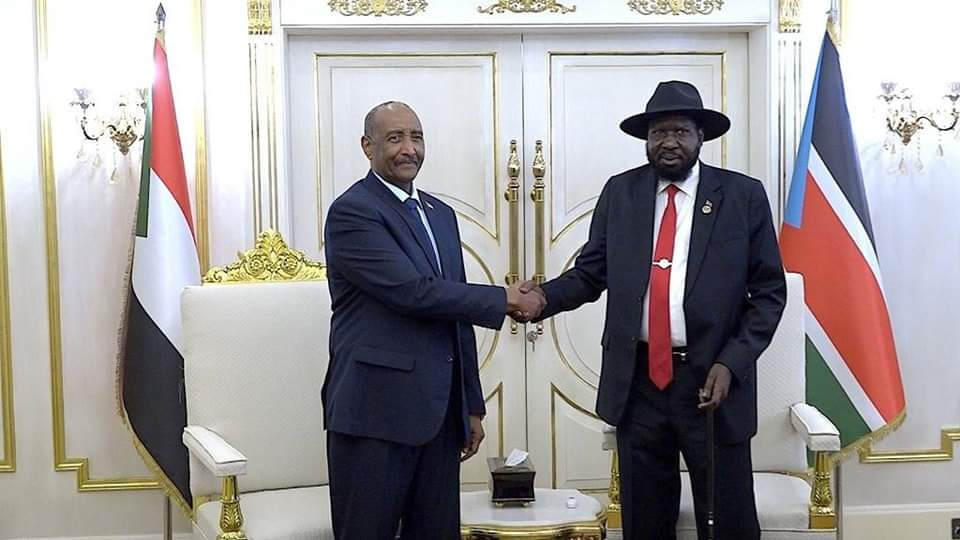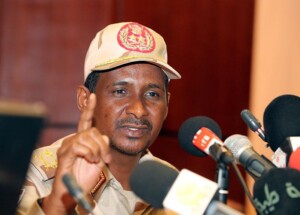Sudan-South Sudan heads El Burhan and Kiir meet in Juba

Sudan’s Sovereignty Council head, Lt Gen Abdelfattah El Burhan, met with South Sudan’s President, Lt Gen Salva Kiir Mayardit, in the South Sudan capital Juba yesterday (Photo: Sudan Sovereignty Council)
Sudan’s Sovereignty Council head, Lt Gen Abdelfattah El Burhan, met with South Sudan’s President, Lt Gen Salva Kiir Mayardit, in the South Sudan capital Juba yesterday, “to bolster bilateral ties and navigate a challenges brought on by the ongoing war” between the Sudan Armed Forces (SAF) and the paramilitary Rapid Support Forces (RSF).
The head of the Sovereignty Council, and de-facto president of Sudan, Lt Gen Abdelfattah El Burhan, and South Sudan’s President Lt Gen Salva Kiir Mayardit held talks in Juba, South Sudan’s capital, on Monday, focusing on bolstering bilateral relations and advancing cooperation.
During a press briefing, Sudan’s acting Minister of Foreign Affairs Ali El Sadig highlighted regional efforts, particularly those by South Sudan, to address Sudan’s crisis and explore future peace initiatives. He mentioned the talks also addressed repeated attacks by the Sudan People’s Liberation Movement-North (SPLM-N), led by Abdelaziz El Hilu.
El Sadig emphasised “as Sudanese, we consider South Sudan the most suitable mediator to address our crisis due to our shared destiny and deep historical ties.”
South Sudanese Foreign Minister Deng Dao expressed that this visit offered “an opportunity to update South Sudan’s leadership on Sudan’s evolving situation and discuss potential solutions”.
El Burhan arrived in Juba on Monday morning, accompanied by Foreign Minister Ali El Sadig and Military Intelligence Director Ahmed Ibrahim.
Diplomacy
Journalist and political analyst Ashraf Abdelaziz suggested that Burhan’s visits to neighbouring countries aim to establish his legitimacy and gain international recognition, particularly to participate in upcoming United Nations Security Council meetings in New York.
In an interview with Radio Dabanga, Abdelaziz argued that El Burhan could potentially form an interim government, using it as a steppingstone for a future presidential candidacy. “However, the situation on the ground may alter these scenarios, particularly if the RSF achieves significant victories and gains full control of Khartoum.”
El Burhan faces a significant challenge: whether to heed calls for an end to the conflict, leading to a new political process, or to persist in asserting the legitimacy of his government, which faces resistance from most Sudanese people.
Abdelaziz contended that Burhan is aligning with elements of the former regime to legitimise the current government and prolong the conflict, aiming for a decisive victory over the RSF. If he senses defeat, Abdelaziz speculated that El Burhan might explore political manoeuvring and engage with the Forces of Freedom and Change.
Journalist and political analyst Hafez Kabir viewed Burhan’s visit to Juba as part of broader regional efforts to achieve a peaceful settlement in Sudan. He explained that Burhan’s visits to Juba and Cairo are part of wider discussions aimed at ending the conflict, despite disagreements over demilitarising the capital.
Kabir emphasised the significance of South Sudan’s role in hosting talks and the Juba Agreement, highlighting the historically significant relations between South Sudan and Sudan. He anticipated that El Burhan might visit other countries as part of ongoing efforts to resolve the crisis.
Stressing the importance of creating an environment conducive to accepting external initiatives, Kabir believes that addressing humanitarian concerns, securing support, and initiating reconstruction efforts will require international intervention. He expects the visit to also address the situation in South Kordofan and Blue Nile, particularly the actions of the SPLM-N (El Hilu), to bring stability to the region and incorporate El Hilu into future settlements.











 and then
and then